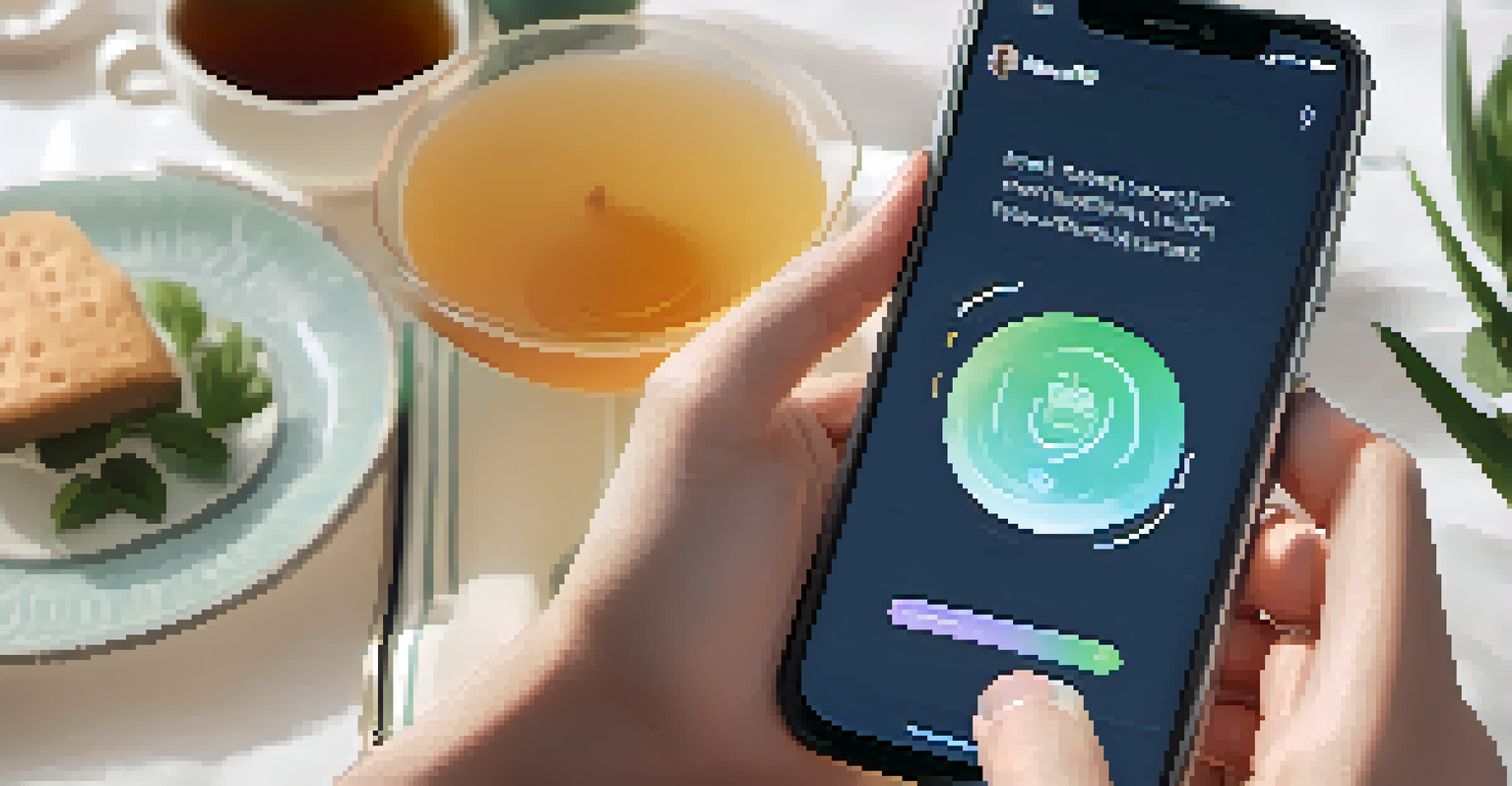Benefits of Mobile Apps for Mental Health Management Strategies

Improved Accessibility to Mental Health Resources
Mobile apps have made mental health resources more accessible than ever. With just a few taps on your smartphone, you can access therapy, mindfulness exercises, and educational materials. This convenience allows users to engage with mental health strategies anytime and anywhere, breaking down barriers to care.
Mental health is not a destination, but a process. It's about how you drive, not where you're going.
For instance, someone experiencing anxiety can use an app to practice deep breathing exercises during a stressful moment, rather than waiting for their next therapy session. This immediate access fosters a sense of empowerment, as users realize they can take control of their mental well-being.
Moreover, accessibility is especially crucial for those living in remote areas where professional help may be scarce. Mobile apps bridge this gap, ensuring that everyone has the opportunity to prioritize their mental health, no matter their location.
Enhanced Engagement Through Interactive Features
Many mental health apps incorporate interactive features that enhance user engagement. From mood tracking to gamified challenges, these tools encourage users to actively participate in their mental health journey. Engaging activities can make the process feel less daunting and more enjoyable.

For example, a mood tracking app might prompt users to log their feelings daily, helping them identify patterns and triggers over time. This self-awareness is a powerful tool for managing mental health, as it allows individuals to recognize what affects their mood and take proactive steps.
Accessible Mental Health Resources
Mobile apps make mental health support easily accessible anytime and anywhere.
Additionally, the interactive nature of these apps fosters a sense of community. Many platforms include forums or chat features where users can share experiences and support one another, creating a supportive network that can be invaluable in difficult times.
Personalized Mental Health Strategies and Insights
One of the standout benefits of mobile apps is their ability to provide personalized mental health strategies. Many applications use algorithms to tailor recommendations based on user input, such as mood patterns, preferences, and specific challenges. This customization makes mental health management more effective.
The greatest weapon against stress is our ability to choose one thought over another.
For instance, if a user indicates they struggle with insomnia, the app might suggest tailored sleep hygiene tips or calming bedtime routines. This personalized approach ensures that users receive relevant advice, making it more likely they will implement the strategies suggested.
Furthermore, personalized insights can help users track their progress over time. By visualizing improvements or setbacks, individuals can adjust their strategies accordingly, leading to a more dynamic and responsive approach to their mental health.
Cost-Effective Mental Health Support Solutions
Mental health apps often provide cost-effective solutions in comparison to traditional therapy. While in-person sessions can be expensive, many apps offer free or low-cost resources, making mental health support accessible to a wider audience. This affordability can encourage individuals to seek help without financial burden.
For example, a user might download a mindfulness app that offers guided meditations at no cost, whereas attending a meditation class may involve significant fees. This disparity highlights how mobile apps can democratize access to mental health tools and resources.
Personalized Mental Health Strategies
Many apps offer tailored recommendations, enhancing the effectiveness of mental health management.
Moreover, many apps also provide free trials or limited features, allowing users to explore what works for them before committing financially. This flexibility empowers individuals to find the right mental health support without feeling pressured.
Anonymity and Stigma Reduction in Mental Health Care
The anonymity provided by mobile apps can be a game-changer for those hesitant to seek help. Many individuals still face stigma associated with mental health issues, which can deter them from accessing traditional therapy. Mobile apps allow users to engage with mental health resources privately, reducing the fear of judgment.
For instance, someone dealing with depression may feel more comfortable logging their thoughts in an app rather than discussing them face-to-face with a therapist. This safe space can encourage more open communication and self-reflection, leading to better outcomes.
As users become more accustomed to engaging with mental health care in a low-pressure environment, they may eventually feel empowered to seek additional support, whether through therapy or community resources, helping to break down societal stigmas.
Continuous Support Through Reminders and Notifications
Mobile apps offer continuous support through reminders and notifications, helping users stay engaged with their mental health strategies. Whether it’s a gentle nudge to practice mindfulness or reminders to log emotions, these features can keep mental health practices top of mind. This consistent engagement can reinforce positive habits.
For instance, a user may receive a daily notification encouraging them to take a moment for self-care, such as journaling or practicing gratitude. These small reminders can make a significant difference in creating a routine that prioritizes mental well-being.
Convenient Teletherapy Options
Mobile apps provide access to professional help through teletherapy, reducing barriers to care.
Additionally, some apps allow users to set personalized goals and track their progress, further motivating them to stay committed to their mental health journey. This ongoing support fosters a sense of accountability and encourages users to celebrate their achievements, no matter how small.
Integration with Other Health and Wellness Tools
Many mental health apps can integrate seamlessly with other health and wellness tools, creating a holistic approach to well-being. For example, an app that tracks physical activity can work alongside a mental health app to show users how exercise impacts their mood. This interconnectedness can provide a clearer picture of overall health.
Imagine a user who tracks both their workouts and their mood; they may discover that after a week of regular exercise, their anxiety levels decrease. This kind of insight can empower users to adopt healthier habits that benefit both their physical and mental health.

Moreover, integration with calendars and reminders ensures that users can schedule time for both physical and mental health activities, promoting a well-rounded approach to self-care. This synergy between different aspects of wellness is essential for achieving optimal health outcomes.
Access to Professional Help and Teletherapy Options
Many mental health apps now offer access to professional help, including teletherapy options. This feature allows users to connect with licensed therapists through video calls, chats, or messaging, making it easier to seek professional support when needed. This blend of technology and therapy can be a lifeline for many.
For instance, a busy professional may find it challenging to fit in traditional therapy sessions. However, with teletherapy options available through a mobile app, they can schedule appointments that fit their lifestyle, ensuring they receive the support they need without added stress.
Furthermore, the convenience of teletherapy can encourage more individuals to seek help. Knowing that they can access a licensed therapist from the comfort of their home can reduce barriers and make mental health care more appealing.